|
|
Attended conferences MMMPA attended the 2012 Forum of Marine Protected Areas (MPAs) in the Mediterranean that took place on the 25-28 of November 2012, in Antalya (Turkey). The FORUM brought together Mediterranean MPA key players in a unique event that promotes a constructive dialogue between all actors of MPAs in the Mediterranean in order to share experience and knowledge, identify of the needs and prompt reinforce MPAs' ecological representativeness and MPA management efficiency. Several crucial aspects for the established Marine Protected Areas where presented such as progress of science in monitoring and improvements in management effectiveness, technology advances in data exchange, involvement of private sector towards concrete commitments towards MPAs in the coming years, set the basis for establishing a sustainable funding strategy. Key challenges were explored; opportunities and potential solutions were presented through discussions on round tables across all stakeholders to shape sustainable solutions for MPAs in the future. In this context, Mediterranean MPA key players reviewed the status of MPAs in the region and identified the actions needed to improve the Mediterranean network of MPAs for the coming decade and beyond. Consultants agreed on the Antalya declaration and a road map for MPA's based on the vision to achieve, by 2020, the objectives set by international commitments. All key players were invited to adhere to the roadmap and its vision and to contribute actively to achieve its goals set. MMMPA attended several presentations for several aspects concerned its objectives, presented a poster and participated in the workshops and round table activities of the FORUM. A questionnaire was spread to Mediterranean MPA managers to explore their needs, their familiarity with web-based management tools, and assess the current state of the existing MPAs. The results of this questionnaire will be published soon along with the main outcomes of this survey. Reported by Vasiliki Markantonatou
MMMPA attended the twelfth International Symposium - GEOHAB (Marine Geological and Biological Habitat Mapping) Rome - Italy, 6-10 May 2013 and hosted by the Geological Survey of Italy - ISPRA together with the Institute for Coastal and Marine Environment - CNR. The Symposium brings together geologists, biologists, acousticians, statisticians, spatial analysts and environmental managers from around the world, who are developing new methods and procedures to link remotely sensed data with seafloor geology and marine biology within a geo-spatial environment. Delegates from around the world presented posters and seminars highlighting the latest seabed mapping research and providing a truly multidisciplinary and exciting forum for exchange of knowledge and ideas. Different aspects regarding new developments in the use of proxies for ecosystem characterization were discussed, giving a global state-of-the-art perspective on habitat mapping. In particular, MMMPA attended several presentations for several aspects concerned its objectives and presented a poster: "The visualization of geographical dataset on mobile devices using Augmented Reality application: a case of study from Liguria Region". We presented results regarding the capacity of the Augmented Reality to display geographical dataset in a virtual environment. We used bathymetric data collected by the Liguria Region and benthic habitat information to develop a 3D reconstruction of the geomorphological data from Gallinara Island (Ligurian Sea, Italy). Our results provide a new way of visualizing marine geophysical dataset that can be run on low cost mobile devices. Furthermore, we showed that the proposed method could be applied as a standard protocol for future Augmented Reality applications. Reported by Paula Zapata
In 2013 the Port-Cros National Park celebrated 50 years since its establishment, in 1963. Port-Cros was the first marine park created in Europe and has become an example of good management practices among Mediterranean Marine Protected Areas (MPAs). The congress was finalized to discuss the scientific research carried out so far in the park, present the partners and evaluate future research topics, as well as increase sustainable development and good environmental protection practices. More than two hundred scientists attended the congress and several sessions were presented: history of the park, flora and fauna diversity, alien species management, protection effects on fish communities, artisanal fisheries, marine mammals conservation, economic incomes from sea protection, surveillance actions, tourism and role of research in MPA management. MMMPA participated to the congress with an oral presentation on the scientific and training goals of the project, to be reached also in collaboration with the National Park. As project partner in fact, the Port-Cros National park will host some MMMPA research activities and training periods. Additionally, the studies carried out by two early-stage researchers hosted at the University of Nice (France) have been discussed, regarding the conservation and restoration of marine forests and the use of models to assess trophic relationships and fish biomass in MPAs. Finally, the congress was the occasion for scientists and MPA managers to exchange ideas and recommendations for the management of French Mediterranean coasts and marine parks. Reported by
Fabrizio Gianni & Giulia Prato
MMMPA Early-Stage Researchers attended the Third International Marine Protected Areas Congress (IMPAC3), which took place in Marseille from October 21 to October 25, 2013. IMPAC is the most important congress on Marine Protected Areas (MPAs), organized every four years and brings together major maritime stakeholders from around the globe to assist in the conservation and sustainable development of the oceans. Participants represent public management and planning agencies, research institutions, non-governmental organizations, coastal or island communities, and sea-related industries, from fishing to cable laying, mining, shipping and tourism. Reed the full report in PDF... To know even more... follow the blog on protectplanetocean.org Reported by Fabrizio Gianni
CIESM integrates a broad spectrum of marine disciplines, encompassing geo-physical, chemical and biological processes, along with high-resolution mapping of the sea-bottom, applying the latest scientific tools to better understand, monitor and protect a fast-changing, highly impacted Mediterranean Sea. MMMPA attended CIESM Congress from October 28 to November 1, 2013, in Marseille, France. A wide variety of topics were presented: pollution, ocean acidification, species interactions, biogeochemical studies, connectivity, coastal fisheries, alien species, habitat dynamics, modelling and much else. In the workshop "MPA management", MMMPA presented a study on the conservation and restoration of Mediterranean marine forests. It was an opportunity to highlight the relevance of marine forests in sustaining marine biodiversity and propose a greater protection and a reasoned restoration of Cystoseira forests by the means of non-destructive techniques and with the support of MPAs. In particular, such arguments were highly discussed during the poster session. The congress was also proficient for new contacts and perspective of collaborations with researchers from other Mediterranean and Black Sea Universities. Reported by Fabrizio Gianni
Participation of MMMPA to the 10th International Conference on Environmental Management of Enclosed Coastal Seas (EMECS 10) & The 11th International Conference on the Mediterranean Coastal Environment (MEDCOAST 2013), 30 Oct- 03 Nov 2013, Marmaris, Turkey The 10th International Conference on Environmental Management of Enclosed Coastal Seas (EMECS 10) & The 11th International Conference on the Mediterranean Coastal Environment (MEDCOAST 2013) took place as a joint conference during 30 Oct- 03 Nov 2013 in Marmaris, Turkey. The Congress aimed to identify lessons learnt and augment knowledge coming from this cumulated experience for more efficient future sustainability over precious coastal areas of the world. The event hosted schools, scientists, managers, planners, policy makers, administrators and resource developers who reviewed the current efforts and experiences on integrated coastal management (ICM). Academic institutions have developed various new educational programs and have advanced human capabilities for addressing coastal challenges. Many tools and instruments, simple and sophisticated, practical and scientific, have been designed and refined for effective integrated coastal management. Currently numerous local, regional, national and international projects and programs exist aiming to develop ICM along the coastlines, focusing on ecosystem based management, collaborative management, or emerging issues such as climate change and marine litter. Additionally, new approaches such as the blue economy have been introduced. MMMPA project presented on Friday 01 November 2013, under the Session "Coastal and Marine Protected Areas". During the presentation entitled "Stakeholders, Technology and MPAs:
The Marmaris Declaration, adapted by more than 300 participants from 40 countries who attended the EMECS/MEDCOAST conference, summarizes the lessons learned and calls for taking action regarding the emerging marine and coastal treats (e.g. climate change, marine litter etc.), new forms of education and true awareness in order to change human behavior, expanded networking opportunities for knowledge sharing, the use of every day communication technology to bring about changes in environmental policies, and development of tools including outstanding science, science-based policy, electronic advances in monitoring, education and communication through a continuous improvement process. Reported by Vasiliki Markantonatou "The most beautiful ocean is the one we have yet to
cross"
MMMPA attended the Conference organized by the French Phycological Society that took place on the 16-18 of December 2013 at the Roscoff Marine Station (Brittany, France). The Conference, named "Perspectives of Phycology", brought together numerous people coming from different research Institutes of France and from other Universities in the world. Different aspects concerning marine algae were discussed: biodiversity and taxonomy, chemical components produced by algae, phylogeography, invasive algae, genetic relationships, the metabolism of algae, biochemistry, genomics, interactions of algae with herbivores and algal physiology. Under the session "Ecology and population genetics", MMMPA presented a recent study carried out by the University of Nice and entitled: "Perspectives for Cystoseira conservation and restoration in the framework of an European Programme". This study permitted to improve Cystoseira restoration and better understand the role of herbivorous fish in regulating macroalgal assemblages in the infralittoral fringe. MMMPA Project was also presented to the conference participants and some flyers were distributed. During poster session, planned on the second day, researchers had the opportunity to share own experiences and discuss about potential collaborations for future studies on ecological restoration. Finally, the French Phycological Society renewed its Council and debated on the importance of the Society in the international scientific context. Reported by Fabrizio Gianni MMMPA researchers attended the Conference organised by the Estuarine & Coastal Sciences Association (ECSA) held in Sesimbra, Portugal from May 12 to 16, 2014. ECSA is an international organization dedicated to the study of all aspects of estuarine and coastal marine science, and also the application of science for conservation and environmental management. This year the conference was focused to explore the topic of environmental change in estuarine and coastal systems and to develop advanced assessment and management tools.
MMMPA researchers participated to the congress with two oral presentations. First, Patricia Marti Puig presented a poster on "Morphometric and genetic distinctness between two closely related species of limpets (Patella rustica and Patella caerulea) among Marine Protected Areas in the western Mediterranean", showing some a set of measurements to distinguish these two closely related limpets. She also gave a talk on "genetic connectivity of the species Patella rustica and Patella caerulea among four marine protected areas in the western Mediterranean" in the "Connectivity and its implications towards conservation and management" session, showing the some of the genetic results that will be useful to evaluate the connectivity among the Marine Protected Areas to further give an advice about their efficiency for Marine Protected Areas managers.
Daniel Mateos Molina gave a talk on "Turbidity as a threat to the coastal benthic habitats" within the "Improving management and decision processes: advances in predictive tools" session, showing previous results of a benthic vulnerability map obtained by combining benthic habitats distribution, their sensitivities to turbidity variations, derived from literature, and turbidity scenarios. This study provides essential information to develop a reliable and robust framework, able to assist decision makers to set appropriate monitoring and effective management policies. Reported by Patricia Marti Puig & Daniel Mateos Molina
Reported by Vasiliki Markantonatou and Katie Hogg
MMMPA attended the 49th European Marine Biology Symposium that took place on the 8-12 September 2014, in St. Petersburg, Russia and hosted by the Zoological Institute, Russian Academy of Sciences.
Reported by Paula Zapata and Antonio Cal˛ MMMPA attended the 5th International Otolith Symposium that took place on the 20-24 October 2014, in Mallorca, Spain and hosted by the The International Council for the Exploration of the Sea (ICES). The symposium covered all the currently studied aspects about fish otoliths and other calcified structures. The aim of the symposium was the exploration of the use of calcified tissues as tools to support management and the formulation of a definition of indicators at environmental, community, population, and individual levels. The symposium was organised as a series of presentations alternated with plenary sessions. MMMPA early-stage researcher Antonio Cal˛ (ESR07) attended the symposium and showed part of the results of the studies carried out until now within the MMMPA project. The title of his talk was "The role of competency phase in determining spatial variability in fish early life traits. a case study from a Mediterranean coastal species". The presentation showed how the last moment of the larval phase of a Mediterranean commercially important fish can influence its early life traits and its pattern of settlement in coastal habitat. Reported by Antonio Cal˛
SYMPOSIA ON THE CONSERVATION OF MEDITERRANEAN MARINE KEY HABITATS, Portoro×, Slovenia, 27-31 October 2014 RAC/SPA, in collaboration with UNEP and MEP, organised this year the Symposia on the Conservation of Mediterranean Marine Key Habitats in Portoroz, Slovenia. Symposia were organised within the framework of the implementation of Action Plans adopted by the Contracting Parties to the Barcelona Convention. The main objective of Symposia was to gather available knowledge on these habitats and exchange information and experience among scientists. This year, Symposia regarded three main
topics, we partecipate to the following sessions:
Contributions of MMMPA to the Symposium: Reported by Vasiliki Markantonatou, Paula Zapata and Fabrizio Gianni
Following sessions ("Ecosystem evolution and challenges for management", "Modelling cumulative ecosystems dynamics" and "End-to-end modelling") showed how EwE is pushing the boundaries and breaking new grounds in spatial-temporal modelling , climate change and end-to-end modelling. This advances have been possible thanks to the synergistic cooperation among scientists across the world and the possibility of coupling EwE with other modelling approaches.
Reported by Giulia Prato Attended external courses
The Department of Physics, University of Malta, and Highland Geo Solutions, in collaboration with the National Oceanography Centre, Geomara, RPM Nautical Foundation, Vella Marine Malta, University of Washington, Earth Sciences and Surveying (EGS), S.A.N.D., AquaBioTech Group, Blue Marble Geographics, Caris, Chesapeake Technology, EIVA, Eye4 Software, Fledermaus, Kongsberg, Marine Institute, QPS, ROMOR and Triton Imaging Inc. organized an on-site training course on sea exploration methods from 15 to 19 July 2013 at the wonderful Islands of Malta. The Seafloor Exploration Training Course is a programme that provides a comprehensive introduction to the theoretical, scientific, technological and operational aspects of seafloor exploration and surveying. The course is given through intensive theoretical classes and hands-on practical sessions on a research vessel, The Hercules, a vessel that has many unique capabilities including state of the art tools to enhance data acquisition and fully functional GIS capabilities. In the course I had the opportunity to learn the basic and applicable knowledge on hydrographic mapping, benthic habitat mapping; mineral exploration and software development. In particular, during the theoretical course, we have the opportunity to be exposed to many different types of marine survey hardware and software, which will prepare the data for both commercial and academic assignments. During the expedition on the Hercules, we gather information regarding acoustic measurements, bathymetry, sub-bottom profiles, magnetometry, in situ optics, and seafloor video observations. Later on we made some practical exercises with the data collected and the different hardware and software available. Steps related with 1) data acquisition 2) data processing 3) data visualization and 4) data interpretation were carried out. The course tackled very interesting topics related to the use of these information for the ecosystem management, monitoring of environmental change, fisheries management, navigation, blue energy, carbon capture and storage and Marine protected Areas design. The thrill of exploration, mixed with the use of advanced marine technology and the ability to collaborate with experts in other mapping activities has excited me truly, up to the point of continuing these activities in my future career development. Reported by Paula Zapata
|
|
||||
|
|
||||||





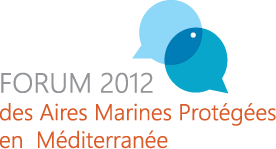




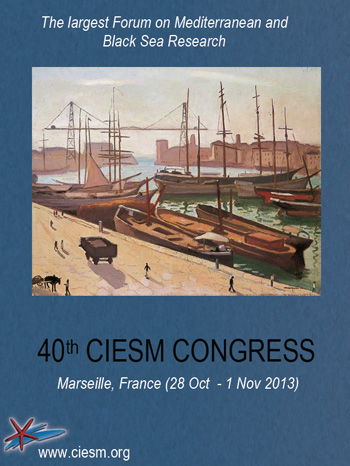

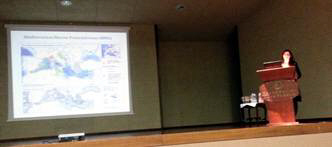


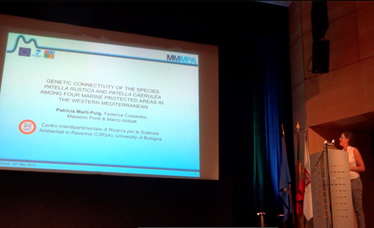
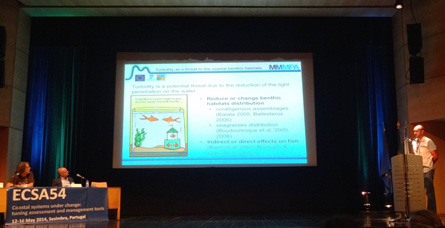

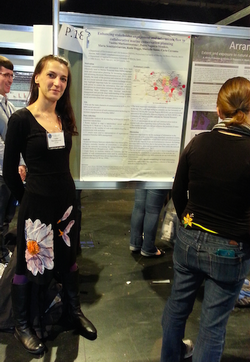 MMMPA early-stage researchers (ESR08 and ESR10) attended the Third International Marine Conservation Congress (IMCC) organised by the Society for Conservation Biology Marine Section, which took place in Glasgow from August 14th to August 18th 2014. IMCC congresses are the largest academic conferences held specifically on marine conservation, bringing together the worlds leading academics and conservationists. The overarching theme of the IMCC conferences is to make marine science matter, the aim of being to go beyond the standard format of marine science conferences and produce tangible outputs and make actual progress between meetings. Alongside regular conference presentation sessions, there were sessions such as workshops and symposia, which oblige organisers to produce tangible outputs in the form of strategy plans, white papers, proposals, action plans etc.
MMMPA early-stage researchers (ESR08 and ESR10) attended the Third International Marine Conservation Congress (IMCC) organised by the Society for Conservation Biology Marine Section, which took place in Glasgow from August 14th to August 18th 2014. IMCC congresses are the largest academic conferences held specifically on marine conservation, bringing together the worlds leading academics and conservationists. The overarching theme of the IMCC conferences is to make marine science matter, the aim of being to go beyond the standard format of marine science conferences and produce tangible outputs and make actual progress between meetings. Alongside regular conference presentation sessions, there were sessions such as workshops and symposia, which oblige organisers to produce tangible outputs in the form of strategy plans, white papers, proposals, action plans etc. 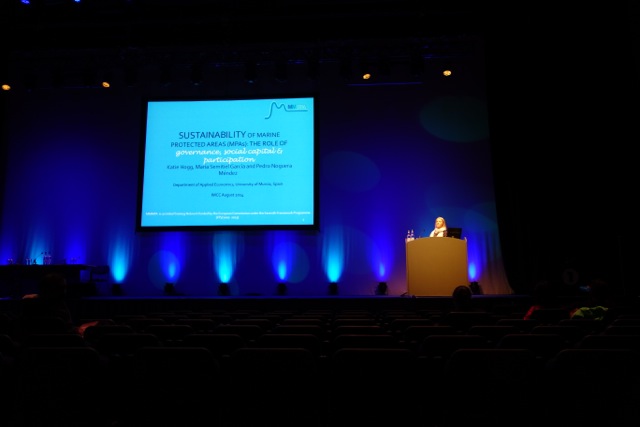
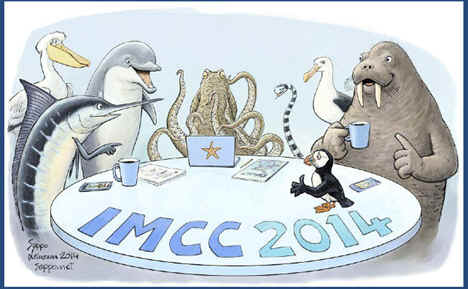
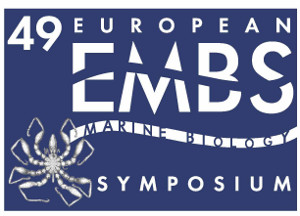
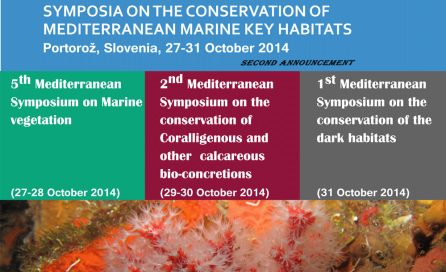
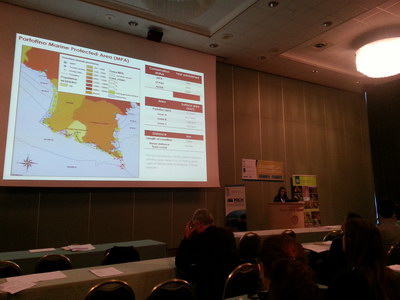

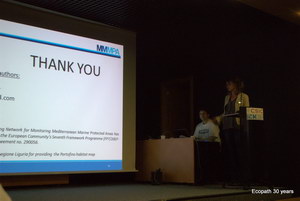 MMMPA early-stage researcher Giulia Prato (ESR05) attended the conference & workshops "Ecopath 30years, modelling dynamic ecosystems: beyond boundaries with EwE" held in Barcelona from the 10th to the 13th of November and hosted by the Institute of Marine Science (ICM-CSIC). The conference displayed thirty years of progress using the Ecopath with Ecosim (EwE) ecosystem modelling approach
(
MMMPA early-stage researcher Giulia Prato (ESR05) attended the conference & workshops "Ecopath 30years, modelling dynamic ecosystems: beyond boundaries with EwE" held in Barcelona from the 10th to the 13th of November and hosted by the Institute of Marine Science (ICM-CSIC). The conference displayed thirty years of progress using the Ecopath with Ecosim (EwE) ecosystem modelling approach
(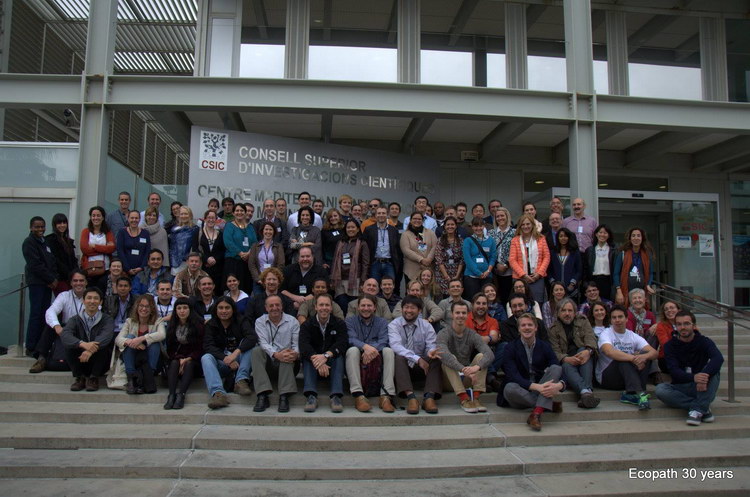

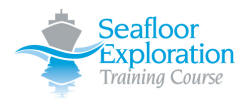 Seafloor Exploration Training Course
Seafloor Exploration Training Course
